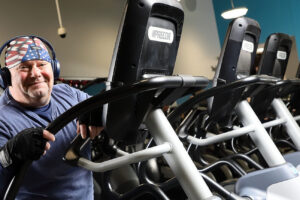Research has shown that patients have the best chance of recovery if their arteries are opened within two hours of a heart attack, according to Jatinchandra Patel, DO, medical director of the Cardiovascular Interventional Laboratory at CentraState.
Emergency angioplasty, also known as emergency PCI (percutaneous coronary intervention), is a procedure that does just that for patients who are experiencing a heart attack. The procedure requires licensing approval from the New Jersey Department of Health – and CentraState was recently awarded this designation for meeting all necessary qualifications in its Cardiac Catheterization Lab, a part of CentraState’s state-of-the-art Cardiovascular Interventional Laboratory where the procedure is performed.
How it Works
Through CentraState’s Emergency Angioplasty Program, our interventional cardiology team can quickly locate a blockage in a patient having a heart attack, restore blood flow to the heart, and minimize or prevent heart damage through a minimally invasive technique called balloon angioplasty.
During this procedure, a thin, flexible catheter is inserted through the wrist or groin and threaded through the arteries of the heart. A balloon is inflated to open the blocked arteries of the heart, and in most cases, stents are inserted to open the artery. This lifesaving treatment is available at CentraState 24/7.
A Track Record of Success
Since 2005, our experienced interventional cardiologists have been performing cardiac catheterizations – a procedure that also involves threading a catheter from the wrist or groin to the heart – with excellent outcomes and patient satisfaction. At CentraState, 90% of cardiac catheterizations are performed via the wrist, which is more comfortable and has a shorter recovery.
In addition, CentraState recently centralized cardiac catheterization, endovascular, and interventional radiology services in its new 9,300-square-foot Cardiovascular Interventional Laboratory, streamlining care and adding capacity to serve a greater number of patients.
“We’re expanding access to care for the many people affected by cardiovascular disease,” says Dr. Patel. “At the same time, it’s a great benefit to the community that we can shorten that critical time-to-treatment window, allowing people who show signs of a heart attack to receive immediate treatment at CentraState.”
To learn more about Interventional Cardiology Services at CentraState, visit centrastate.com/cardiology or call 866-CENTRA7 (866-236-8727).





